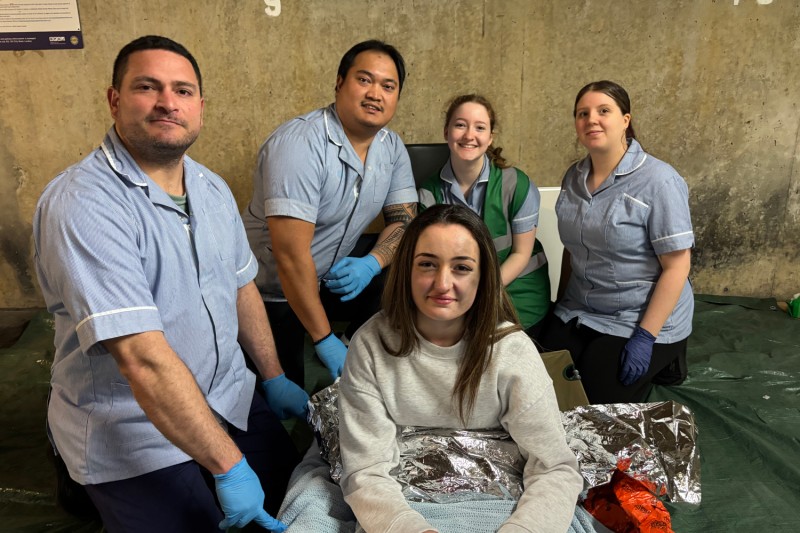Course fees
£1,875.00
For fees and funding info please refer to the FAQs
04 Sep 2025 (Intake closed)
Apply by: 24 Jul 2025
Sept 2025
Face to Face
Attendance dates: 04 Sep 2025, 11 Sep 2025, 18 Sep 2025, 25 Sep 2025, 02 Oct 2025, 09 Oct 2025, 16 Oct 2025, 23 Oct 2025, 13 Nov 2025, 10 Dec 2025 (OSCE), 11 Dec 2025 (OSCE)
15 Apr 2026 (Limited spaces)
Apply by: 04 Mar 2026
April 2026
Pre booked spaces only | Face to face
Attendance dates: 15 Apr 2026, 22 Apr 2026, 29 Apr 2026, 06 May 2026, 13 May 2026, 20 May 2026, 27 May 2026, 03 Jun 2026, 24 Jun 2026, 22 Jul 2026 (OSCE), 23 Jul 2026 (OSCE)
21 May 2026 (Available)
Apply by: 09 Apr 2026
May 2025
Pre booked spaces only | Face to face
Attendance dates: 21 May 2026, 28 May 2026, 04 Jun 2026, 11 Jun 2026, 18 Jun 2026, 25 Jun 2026, 02 Jul 2026, 09 Jul 2026, 30 Jul 2026, 09 Sep 2026 (OSCE), 10 Sep 2026 (OSCE)
Accredited by




Course overview
The History Taking and Physical Examination for Advancing Practice unit helps you to develop a wide repertoire of skills and knowledge that are required to undertake a thorough physical assessment of an adult. It will help you to distinguish normal findings from pathological ones by significantly enhancing your assessment skills and ability to accurately describe your observations and findings using appropriate terminology.
On completion of the unit you will be able to demonstrate an advanced knowledge of applied anatomy and physiology of the human body and competence in your ability to perform a complete physical assessment. You will be able to synthesise and interpret assessment information based on clinical judgement and evidence–based practice.
It is expected, prior to undertaking this unit, that the student will have a breadth and depth of underpinning knowledge of anatomy and physiology, in particular, knowledge of the cardiovascular, respiratory, lymphatic, abdominal, musculo-skeletal and nervous systems.
The understanding, skills and knowledge acquired in this unit are critical for the development of clinical assessment skills, to a more advanced level. In this unit, the student will be supported by lectures and practical teaching sessions in which students acquire history taking and physical examination skills, through practising on each other, in a controlled and facilitated setting, supervised and guided by members of the teaching team. The student will be expected to have reviewed relevant anatomy and physiology in preparation for each session and to have engaged with the on-line learning materials. Learning opportunities within the clinical skills sessions will enable the student to apply theoretical principles and evidence-based practice to the clinical skills being learnt.
Further practice will be gained within the student’s own clinical setting under the supervision of a clinical mentor or other appropriate, clinically-based colleagues. It is, therefore, important that the student Is working, on a regular basis, in an environment where the skills and knowledge are used. This is required to enable immediate development, application and consolidation of new learning within the practice setting and to ensure ongoing application of the skills within the student’s practice.
Learning outcomes
Having completed this unit, the student is expected to:
1. Critically articulate and apply advanced knowledge and understanding of the anatomy and physiology of the human body, to clinical assessment;
2. Demonstrate and critically appraise their ability to obtain an in-depth, structured patient history;
3. Demonstrate competence in their ability to perform a comprehensive, physical examination of body systems, critically appraising normal from abnormal findings.
Assessment
The student undertakes a mOSCE and viva voce assessment that includes history taking, physical examination of body systems and applied anatomy and physiology, with determination of normal from abnormal findings, in a simulated clinical environment.
(3,000 words equivalent)
Course details
Course leader
Helen Currie (hcurrie@bournemouth.ac.uk)
Course delivery
Face to face
Prerequisites
Normally students may enter Level 7 (Master's level) study if they have been awarded:
- Undergraduate degree (honours or non-honours)
- An equivalent qualification (the learning outcome of which are demonstrably appropriate in terms of knowledge, understanding and skills) equivalent to 120 credits at Level 6.
Further practice will be gained within the student’s own clinical setting under the supervision of a clinical mentor or other appropriate, clinically-based colleagues. It is, therefore, important that the student is working, on a regular basis, in an environment where the skills and knowledge are used. This is required to enable immediate development, application and consolidation of new learning within the practice setting and to ensure ongoing application of the skills within the student’s practice.
Why choose BU?
Bournemouth Gateway Building is the home of the Faculty of Health and Social Sciences. Its 10,000 square metres of space has created a unified base for the faculty’s education, research and office activities, which previously took place across several buildings in the Lansdowne area. It is open and accessible to all BU students, staff and the community.
We have a long and close association with health and social care practice partners across the region and enjoy close relationships with Dorset Healthcare University Foundation Trust, University Hospitals Dorset and District Hospitals (Yeovil and Salisbury) and Dorset County Hospital.
We are an established, vibrant and supportive academic community of staff, clinical practitioners, students and service users. Our team of highly qualified nursing staff and social scientists are committed to developing the next generation of outstanding, skilled and compassionate practitioners, having been engaged in developing the nursing workforce for over 25 years.


Make an enquiry
Make an enquiry
